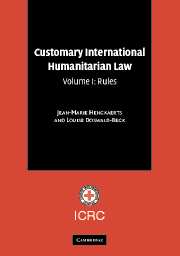Book contents
- Frontmatter
- Contents
- Foreword by ICRC President Jakob Kellenberger
- Foreword by Judge Abdul G. Koroma
- Foreword by Yves Sandoz
- Acknowledgements
- Introduction
- List of abbreviations
- Part I The Principle of Distinction
- Part II Specifically Protected Persons and Objects
- Part III Specific Methods of Warfare
- Chapter 15 Denial of Quarter (Rules 46–48)
- Chapter 16 Destruction and Seizure of Property (Rules 49–52)
- Chapter 17 Starvation and Access to Humanitarian Relief (Rules 53–56)
- Chapter 18 Deception (Rules 57–65)
- Chapter 19 Communication with the Enemy (Rules 66–69)
- Part IV Weapons
- Part V Treatment of Civilians and Persons Hors De Combat
- Part VI Implementation
Chapter 19 - Communication with the Enemy (Rules 66–69)
Published online by Cambridge University Press: 05 June 2012
- Frontmatter
- Contents
- Foreword by ICRC President Jakob Kellenberger
- Foreword by Judge Abdul G. Koroma
- Foreword by Yves Sandoz
- Acknowledgements
- Introduction
- List of abbreviations
- Part I The Principle of Distinction
- Part II Specifically Protected Persons and Objects
- Part III Specific Methods of Warfare
- Chapter 15 Denial of Quarter (Rules 46–48)
- Chapter 16 Destruction and Seizure of Property (Rules 49–52)
- Chapter 17 Starvation and Access to Humanitarian Relief (Rules 53–56)
- Chapter 18 Deception (Rules 57–65)
- Chapter 19 Communication with the Enemy (Rules 66–69)
- Part IV Weapons
- Part V Treatment of Civilians and Persons Hors De Combat
- Part VI Implementation
Summary
Note: This chapter addresses communication related to warfare and not political negotiations undertaken with a view to resolving an armed conflict.
Rule 66. Commanders may enter into non-hostile contact through any means of communication. Such contact must be based on good faith.
Practice
Volume II, Chapter 19, Section A.
Summary
State practice establishes this rule as a norm of customary international law applicable in both international and non-international armed conflicts.
International and non-international armed conflicts
Most military manuals stress that the need may arise, for humanitarian or military reasons, for commanders to enter into contact with the adverse party, in particular to conclude local arrangements dealing with such issues as the search for the wounded, sick and dead, the disposal of the dead, exchange of prisoners, evacuation of persons from a besieged area, passage of medical and religious personnel and flights of medical aircraft. At higher levels, agreements may be concluded to establish a hospital or safety zone, a neutralised zone or a demilitarised zone.
Some military manuals specify that combatants themselves may not enter into contact with the enemy. The Military Handbook of the Netherlands, for example, states that “only a commander may decide to negotiate with the adverse party”.
Practice indicates that communication may be carried out by various means, via intermediaries known as parlementaires but also by telephone and radio. A parlementaire is a person belonging to a party to the conflict who has been authorised to enter into communication with another party to the conflict.
- Type
- Chapter
- Information
- Customary International Humanitarian Law , pp. 227 - 234Publisher: Cambridge University PressPrint publication year: 2005



